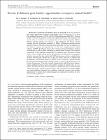| dc.contributor.author | O'FARRELLY, CLIONA | |
| dc.date.accessioned | 2015-12-14T14:06:00Z | |
| dc.date.available | 2015-12-14T14:06:00Z | |
| dc.date.issued | 2014 | |
| dc.date.submitted | 2014 | en |
| dc.identifier.citation | Meade, K.G., Cormican, P., Narciandi, F., Lloyd, A., O'Farrelly, C., Bovine β-defensin gene family: Opportunities to improve animal health?, Physiological Genomics, 46, 1, 2014, 17-28 | en |
| dc.identifier.other | Y | |
| dc.identifier.uri | http://hdl.handle.net/2262/75321 | |
| dc.description | PUBLISHED | en |
| dc.description.abstract | Recent analysis of the bovine genome revealed an expanded suite of β-defensin genes that encode what are referred to as antimicrobial or host defense peptides (HDPs). Whereas primate genomes also encode α- and θ-defensins, the bovine genome contains only the β-defensin subfamily of HDPs. β-Defensins perform diverse functions that are critical to protection against pathogens but also in regulation of the immune response and reproduction. As the most comprehensively studied subclass of HDPs, β-defensins possess the widest taxonomic distribution, found in invertebrates as well as plants, indicating an ancient point of origin. Cross-species comparison of the genomic arrangement of β-defensin gene repertoire revealed them to vary in number among species presumably due to differences in pathogenic selective pressures but also genetic drift. β-Defensin genes exist in a single cluster in birds, but four gene clusters exist in dog, rat, mouse, and cow. In humans and chimpanzees, one of these clusters is split in two as a result of a primate-specific pericentric inversion producing five gene clusters. A cluster of β-defensin genes on bovine chromosome 13 has been recently characterized, and full genome sequencing has identified extensive gene copy number variation on chromosome 27. As a result, cattle have the most diverse repertoire of β-defensin genes so far identified, where four clusters contain at least 57 genes. This expansion of β-defensin HDPs may hold significant potential for combating infectious diseases and provides opportunities to harness their immunological and reproductive functions in commercial cattle populations. | en |
| dc.format.extent | 17-28 | en |
| dc.language.iso | en | en |
| dc.relation.ispartofseries | Physiological Genomics; | |
| dc.relation.ispartofseries | 46; | |
| dc.relation.ispartofseries | 1; | |
| dc.rights | Y | en |
| dc.subject | bovine | en |
| dc.subject | fertility | en |
| dc.subject | immunology | en |
| dc.subject | β-defensin | en |
| dc.title | Bovine b946;-defensin gene family: Opportunities to improve animal health? | en |
| dc.type | Journal Article | en |
| dc.type.supercollection | scholarly_publications | en |
| dc.type.supercollection | refereed_publications | en |
| dc.identifier.peoplefinderurl | http://people.tcd.ie/ofarrecl | |
| dc.identifier.rssinternalid | 95702 | |
| dc.identifier.doi | http://dx.doi.org/10.1152/physiolgenomics.00085.2013 | |
| dc.rights.ecaccessrights | openAccess | |




